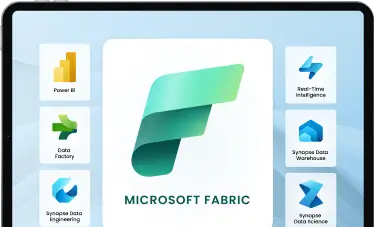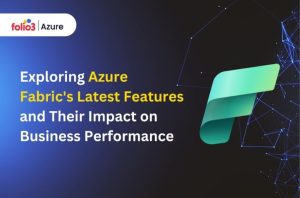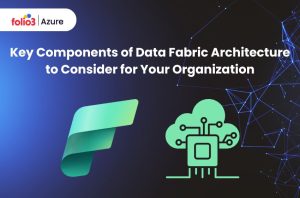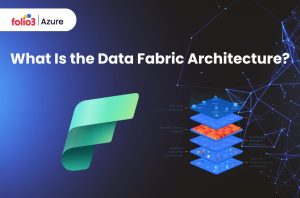Table of Contents
ToggleOur world now is standing on the pillars of modern technology; the choices you make in technology today dictate your business’s success tomorrow. Selecting the best tools for your organization can tremendously affect its efficiency, scalability, and security.
One of the life and death decisions for companies using Microsoft technologies is selecting the most suitable Microsoft Fabric SKU (Stock Keeping Units). It is difficult to find your way through the maze of options available. How do you determine which Fabric SKU best suits your organization’s needs?
This comprehensive guide will help you overcome the intricacies of Microsoft Fabric SKU selection, guaranteeing that you make an intelligent decision that fulfills your business requirements, budget, and industry standards.
Accelerate smart decisions with Microsoft Fabric's unified data and AI analytics.

Assessing Your Organization’s Requirements
Here are some of the best techniques and tips for evaluating the unique needs of your organization:
1. Identifying Business Needs
The first step towards Microsoft Fabric SKU selection is to analyze your organization’s fundamental business needs. This process consists of identifying key metrics such as scalability, performance, and security, which are the lifelines for your operations.
For example, a company in the finance industry might give high priority to security and compliance, while a tech startup might prefer high scalability and performance. Understanding these requirements is mandatory for making a Microsoft Fabric SKU selection that helps you achieve your business goals.
2. Understanding Workload Demands
In addition to considering the generic business needs, assessing your organization’s unique workload requirements is substantial. This involves understanding your data processing, storage requirements, and peak usage times.
For example, if your organization manages large volumes of data, you might need a Fabric SKU that provides high throughput and massive storage capacity. On the flip side, if your workload is more unpredictable, a more flexible SKU that can scale up during peak times might be more suitable.
Accurately assessing these demands will help you select an SKU that meets your performance needs without providing excess resources.
3. Budget Considerations
For any business, its budget is always a significant concern that derives decision making. This is also true of Microsoft Fabric SKU selection. Although choosing the SKU option that provides the maximum features might be attractive, balancing the required functionality and costs is vital.
This means taking into account not only the initial costs of the SKU but also the long-term expenses associated with it, such as maintenance, upgrades, and possible over-provisioning.
For example, some SKUs might come with highly advanced features that your company doesn’t need, making them less cost-effective. On the other hand, you must concentrate on opting for an SKU that provides the necessary features at a price that fits your budget, ensuring maximum performance without unnecessary spending.
4. Compliance and Security Requirements
Today, businesses have to function within the boundaries of strict regulations, compliance, and security. This is especially valid for organizations in industries like healthcare, finance, or government.
When selecting a Microsoft Fabric SKU, it’s valuable to consider the regulations for your specific industry. Certain SKUs are designed with advanced security features and compliance tools that offer enhanced Security in Microsoft Fabric SKUs, making them perfect for industries with strict regulations.
For example, if your organization handles sensitive customer data, you might select an SKU with solid encryption, access controls, and auditing features. By matching your SKU selection with your compliance and security needs, you can ensure that your organization remains safe from risks and regulatory offenses.
Detailed Analysis of Microsoft Fabric SKUs
Let’s dig deeper and discuss the available Microsoft SKUs in detail. This will equip you with valuable information for selecting which fabric SKUs suit your organization’s needs.
1. Performance-Oriented SKUs
Performance-oriented Microsoft Fabric SKUs are the best option for organizations that demand high-performance environments. These SKUs are developed to manage intensive workloads, providing high throughput, low latency, and heavy-duty processing power features.
They are ideal for organizations in finance or technology, where the capacity to process large volumes of data promptly and efficiently is mandatory. Moreover, these SKUs usually come embedded with advanced analytics and reporting tools, enabling real-time data insights that can lead to intelligent decision-making.
Performance-oriented options are often the go-to for businesses with accentuated demands when pondering which fabric SKUs suit your organization’s needs.
2. Cost-Effective SKUs
The cost-effective Microsoft Fabric SKUs provide a perfect equilibrium between functionality and affordability. For organizations with tight budget limitations, these SKUs provide the much-needed features to support their operations without the additional costs of premium options.
They are well-suited for small to medium-sized businesses (SMBs) or startups that need strong features without overspending. When budgeting for Microsoft Fabric SKUs, consider these options to ensure you get the best value for your investment, providing your organization with the mandatory tools to grow without abusing your financial resources.
3. Scalable SKUs
Business needs change in direct proportion to their growth. This gives rise to a need for solutions that can scale with them. Scalable Microsoft Fabric SKUs are flexible and have been developed to fulfill increasing demands, providing adaptable resource allocation that can upscale your organization.
These SKUs are best suited for companies expecting rapid expansion or those in industries with fluctuating demands. By choosing a scalable SKU, you can ensure that your organization remains responsive and competent to meet future challenges without completely changing your IT infrastructure.
Scalability is a major factor influencing Microsoft Fabric SKU selection, especially for businesses aiming to secure their future operations.
4. Security-Focused SKUs
Security is a top priority for most organizations. However, this is a major concern for organizations that handle sensitive data or operate in industries with strict regulations. Security-focused Microsoft Fabric SKUs provide strong and advanced features such as encryption, multi-factor authentication, and thorough auditing capabilities.
These SKUs are designed to meet the highest levels of data protection, making them superb for industries such as healthcare, finance, and government. When analyzing security in Microsoft Fabric SKUs, it’s important to choose an option that meets current requirements and can adapt to future security needs.
Matching SKUs to Use Cases
Now, let’s analyze the SKUs according to various use cases to understand further which fabric SKUs suit your organization’s needs.
Enterprise-Level Organizations
Picking the best Microsoft Fabric SKU is critical for large enterprises with complicated infrastructure and soaring scalability needs. Enterprise-level organizations usually need SKUs that can handle limitless data processing, large-scale analytics, and high levels of security.
Performance-oriented and scalable SKUs are generally the best choice for these organizations, providing powerful features to manage their operations efficiently. Moreover, these SKUs usually include enterprise-grade support and service-level agreements (SLAs), assuring that issues are resolved promptly, thus minimizing downtime and maximizing productivity.
Small to Medium-Sized Businesses (SMBs)
When it comes to choosing Microsoft Fabric SKUs, SMBs have specific requirements. They still need Microsoft Fabric SKU features that provide dependable performance and scalability, even if they might only need a partial range of features in the enterprise-level SKUs.
For SMBs, cost-effective SKUs tend to be the ideal option since they provide the features they need to run their operations without charging excessive rates like premium options do.
With the use of these SKUs, small and medium-sized businesses (SMBs) may efficiently expand their enterprises and compete with more prominent companies using Microsoft Fabric’s powerful features without going over budget.
Industry-Specific Recommendations
Different industries have different requirements that must be considered when selecting a Microsoft Fabric SKU. For example, healthcare organizations might prioritize security-focused SKUs that guarantee compliance with regulations like HIPAA.
Manufacturing companies might need scalable SKUs for complicated supply chain management and data processing tasks. On the other hand, financial institutions may need performance-oriented SKUs that provide real-time analytics and high security.
By matching your SKU’s choice with your industry’s needs, you can warrant that your organization is equipped with all the tools needed to succeed in your target market.
Best Practices for SKU Selection
Certain best practices, such as the following, can help you make the best selection for your SKU.
1. Consulting with Experts
Choosing the suitable Microsoft Fabric SKU can be challenging, and consulting with experts is the best way to ensure you make the right selection. Whether you work with Microsoft representatives or third-party consultants, these experts can provide valuable knowledge about the available SKUs and in-fabric SKU comparison.
Thus helping you match the suitable SKU to your organization’s needs. Expert advice is essential for organizations with complex requirements or those operating in highly regulated industries, where the wrong choice could lead to significant compliance issues.
2. Testing and Proof of Concept (PoC)
Conduct a Proof of Concept (PoC) before committing to a specific Microsoft Fabric SKU. With a Proof of Concept (PoC), you may gauge the performance, scalability, and compatibility of the chosen SKU with your current systems in a controlled environment.
Identifying any possible problems before complete deployment ensures that the selected SKU fulfills your company’s requirements. Selecting Microsoft Fabric SKUs needs testing to provide peace of mind and reduce the possibility of costly mistakes.
3. Ongoing Review and Optimization
The process doesn’t stop even after you’ve selected and implemented a Microsoft Fabric SKU. For the best performance, it’s essential to frequently review and refine your SKU selection as your organization’s needs change over time.
Regularly monitoring SKU performance and comparing it to your organization’s requirements ensures that you always use the most appropriate solution. Additionally, as Microsoft continues to update and expand its SKU features, staying updated about new options can help you take advantage of new features, further enhancing your operations.
Conclusion
Selecting the suitable Microsoft Fabric SKU for your organization is a life-saving decision that has a long-term effect on your operations. By profoundly analyzing your business needs, understanding your workload demands, and considering your budget, compliance, and security requirements, you can make an intelligent decision that matches your organization’s goals.
Whether you’re a large enterprise, an SMB, or operating in a specific industry, a Microsoft Fabric SKU is personalized to your needs.
To ensure that you select the most compatible SKU, it’s suggested that you seek the services of experts, run a PoC, and frequently review your choice. By following these best practices, you can maximize your use of Microsoft Fabric, accelerating your organization’s efficiency, scalability, and security.
If you’re ready to optimize your organization’s IT infrastructure, you must learn more about how Microsoft Fabric can enhance your data analytics and propel your business forward.


